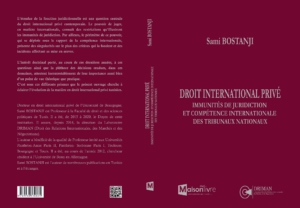We are pleased to announce the publication of the latest issue of the Chinese Journal of Transnational Law (Volume 1, Issue 2, September 2024). The special issue titled “Legalization of Foreign Relations in China” was guest-edited by Professor Congyan Cai.
The full issue is now available with free access for a limited time. You can explore the table of contents and access the articles at this link: Chinese Journal of Transnational Law – Volume 1, Issue 2.
Table of Contents
Special Issue Articles
Legalization of Foreign Relations in China
Zheng Tang and Congyan Cai
pp. 89
Milestone of China’s Foreign-Related Legislation – A Review of the Law of the People’s Republic of China on Foreign Relations
Huang Huikang
pp. 95
Political Framing in China’s Foreign Relations Law: International Law and ‘Fundamental Norms Governing International Relations’
Malcolm Jorgensen
pp. 117
China’s Foreign State Immunity Law: A View from the United States
William S. Dodge
pp. 137
A Critical Appraisal on China’s Blocking Statutes from a Private Actor’s Perspective
Guiqiang Liu
pp. 154
Original Research Article
A Future Uniform Regime of International Commercial Mediator Immunity: Limited, Party-Agreed and Statute-Required
Meng Lin
pp. 176
Short Article and Recent Development
Reading China’s Global Security Initiative Through an International Legal Lens
Ka Lok Yip
pp. 198
Book Review
Liang Xi, Updated and Augmented by Yang Zewei, Liangxi Guojizuzhifa
Gang Tang
pp. 211

 “Droit international privé – Immunités de juridiction et competence internationales des tribunaux tunisiens” (Private International Law – Jurisdictional Immunity and International Jurisdiction of Tunisian Courts) is the title of the long-awaited
“Droit international privé – Immunités de juridiction et competence internationales des tribunaux tunisiens” (Private International Law – Jurisdictional Immunity and International Jurisdiction of Tunisian Courts) is the title of the long-awaited 